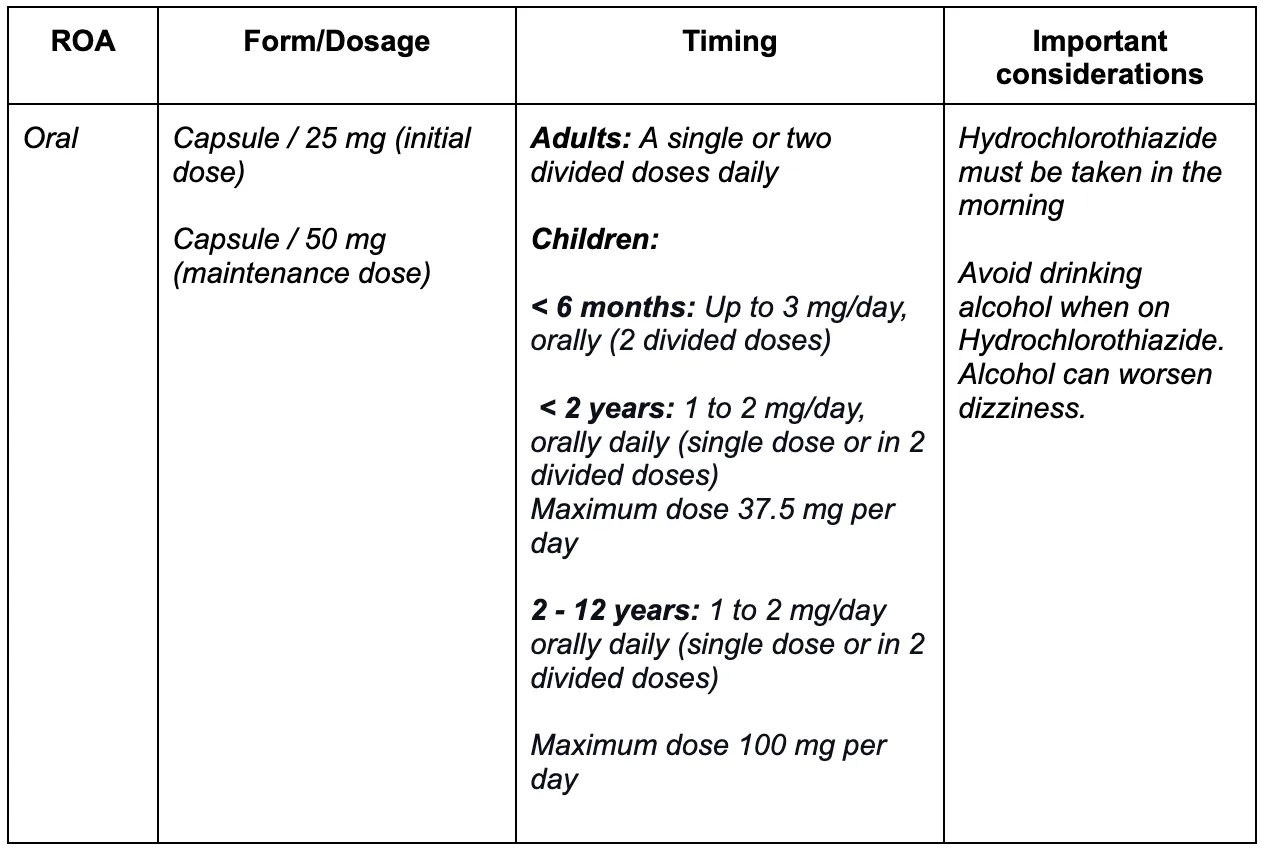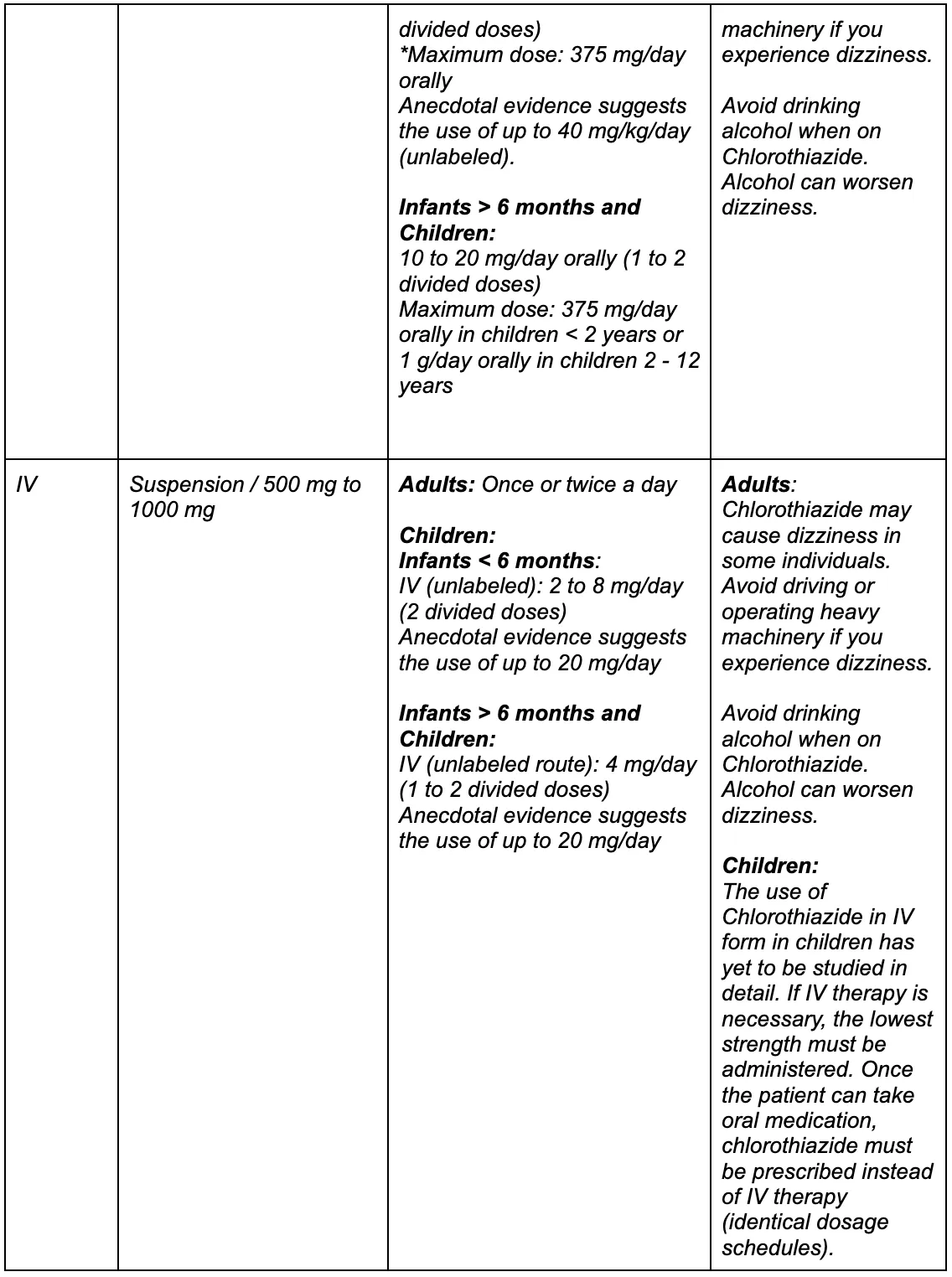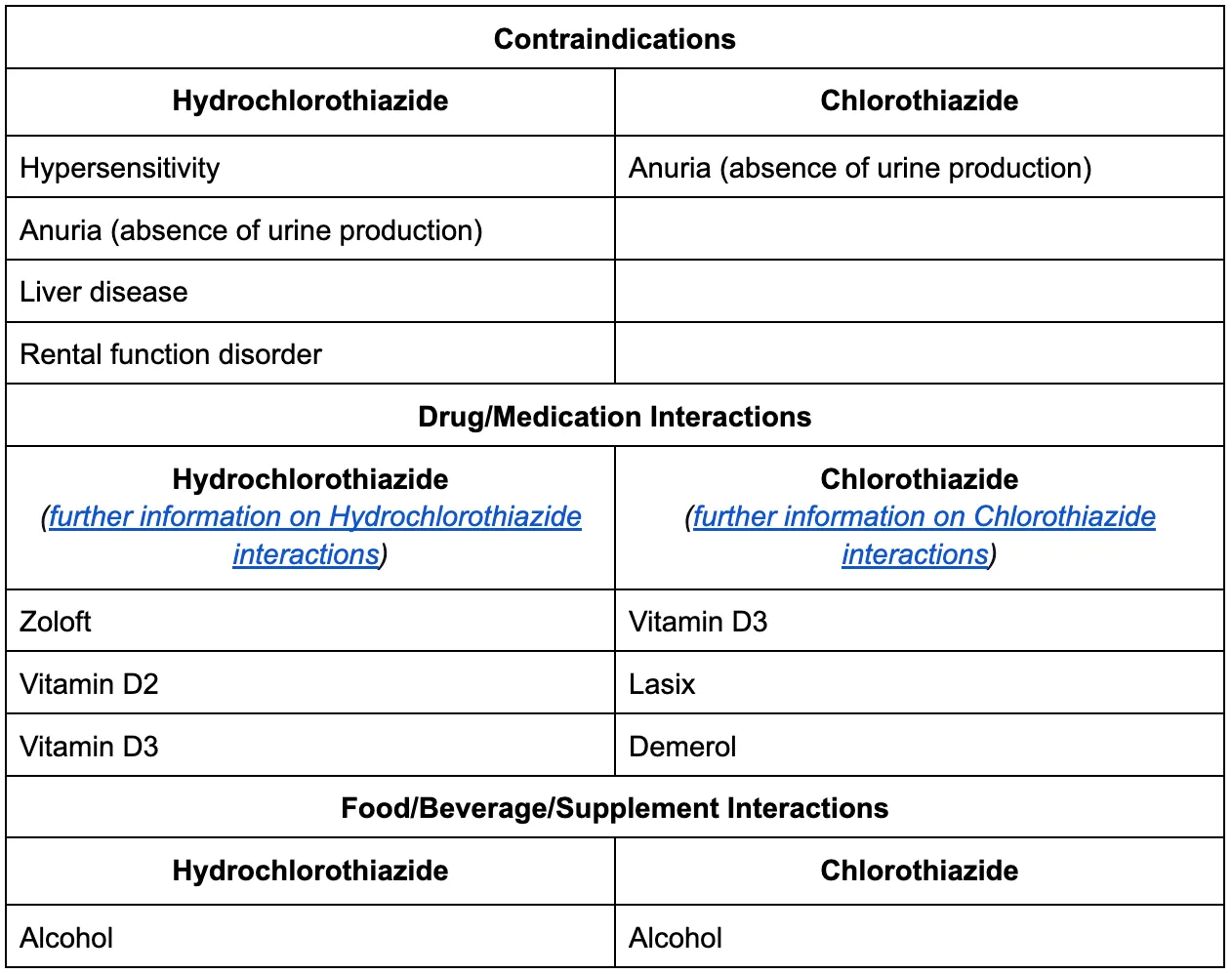Hydrochlorothiazide vs Chlorothiazide
Introduction
According to WHO (World Health Organization), hypertension is the primary cause of premature death worldwide. Science has developed several antihypertensive agents to help hypertensive individuals manage their hypertension levels. Hydrochlorothiazide and Chlorothiazide are two drugs commonly prescribed to hypertensive patients. Although both drugs are diuretics, they have varying efficiency rates and side effects profiles. [1] [2]
About Hydrochlorothiazide and Chlorothiazide
What is Hydrochlorothiazide?
Hydrochlorothiazide was approved by the FDA (Food and Drug Administration) in 1977. It is a diuretic drug commonly used to treat hypertension and Edema. Hydrochlorothiazide is meant to be taken orally and comes in capsule, solution, or tablet form. The medication is administered alone or with other antihypertensive agents to manage hypertension levels effectively. [3] [4]
What conditions is Hydrochlorothiazide approved to treat?
Hydrochlorothiazide is approved to treat several health conditions, including:
- Hypertension
- Edema (fluid retention or excess fluid buildup in the tissues usually triggered by various health issues, including kidney, liver disease, and heart disease)
How does Hydrochlorothiazide work for hypertension?
Hydrochlorothiazide works by interacting with the distal convoluted tubules and blocks the sodium chloride co-transporter system. This results in a diuretic action that helps lower hypertension levels. However, there is potassium loss during the process. [5]
What is Chlorothiazide?
Chlorothiazide was approved by the FDA in 1958. It is a diuretic drug sold under the brand name Diuril. It is widely used as an antihypertensive agent and prescribed alone or with other medications to help patients manage controlled hypertension levels. Chlorothiazide is on the list of essential WHO (World Health Organization) medications. [6] [7]
What conditions is Chlorothiazide approved to treat?
Chlorothiazide is approved to treat several health conditions, including:
- Hypertension
- Edema (fluid retention or excess fluid buildup in the tissues commonly triggered by various health issues, including liver disease, kidney, and heart disease)
How does Chlorothiazide work for hypertension?
Chlorothiazide normalizes hypertension levels by inhibiting active chloride reabsorption at the early distal tubule through the Na-Cl cotransporter, leading to an enhanced sodium, water, and chloride excretion level. This can also cause an increase in potassium excretion. [8]
Effectiveness
How effective are Hydrochlorothiazide and Chlorothiazide for treating hypertension?
Hydrochlorothiazide and Chlorothiazide have an extensive track record of efficacy in treating hypertension. Several trials and research about the effectiveness of both treatments have been undertaken in the previous several decades, with some studies even analyzing the efficacy of both medications in a comparative manner.
A meta-analysis on the comparative efficacy and safety of Hydrochlorothiazide and Chlorthalidone revealed that Chlorthalidone is a more commonly preferred diuretic due to its slight superiority over Hydrochlorothiazide in hypertension control. [9]
Dosage information
How is Hydrochlorothiazide administered for hypertension?
Hydrochlorothiazide is available in capsule and tablet form, both meant to be administered orally. These doses come in three strengths: 12.5mg, 25mg, and 50mg. This medication is commonly prescribed once or twice a day. However, the dosage and frequency of administration can vary from patient to patient. It is important to take Hydrochlorothiazide as directed by your healthcare provider.
Hydrochlorothiazide dosage information
The following table includes information on Hydrochlorothiazide dosage [10]:

How is Chlorothiazide administered for hypertension?
Chlorothiazide is a prescription medication available in a solution and tablet form, both meant to be taken orally. This medication can also be administered as an IV and is available in four strengths 250 mg, 500 mg, 250 mg/5 mL, and 0.5 g. The tablets are only sold as a generic medication, whereas the oral solution is available under a brand name called Diuril. The drug is commonly administered once or twice a day. The strengths prescribed can vary from patient to patient depending. It is vital to take Chlorothiazide as directed by your healthcare provider.
Chlorothiazide dosage information
The following table includes information on Chlorothiazide dosage [11]:


Side Effects
What are the most common side effects of Hydrochlorothiazide?
The most common side effects of Hydrochlorothiazide include [12]:
- Low hypertension levels (usually occurring when one stands up or sits down)
- Headaches
- Photosensitivity (a condition where your skin is more sensitive to the sun)
- Diarrhea
- Muscle spasms
- Dizziness
- Tingling sensation in feet, legs, or hands
- Weakness
- Erectile dysfunction (difficulty getting or maintaining an erection)
Important note! These side effects may go away within a few days or weeks. If they seem to worsen or don't go away after a substantial amount of time, it is best to talk to your doctor.
Are there any potential serious side effects of Hydrochlorothiazide?
Potentially serious side effects of Hydrochlorothiazide include:
- Kidney failure (Swollen legs, ankles, or feet, weakness, difficulty breathing, tiredness, confusion, abnormal chest pain or heart rate, reduction in the frequency of urination)
- Pancreatitis or inflamed pancreas (vomiting, upset stomach, severe back or stomach pain)
- Severe allergic reactions (exfoliative dermatitis, Stevens-Johnson syndrome, painful rash, peeling skin, blisters, mouth sores, fever)
- Blurred vision (trouble seeing, eye pain)
Important note! Consult your doctor immediately if you experience any of the above symptoms, or call 911 if the symptoms feel like you are in a medical emergency or if the side effects are life-threatening.
Are there the most-common side effects of Chlorothiazide?
Most common side effects of Chlorothiazide include [13]:
- Frequent urination
- Loss of appetite
- Diarrhea
- Dizziness
- Headache
Are there any potential serious side effects of Chlorothiazide?
Potentially serious side effects of Chlorothiazide include:
- Electrolyte imbalance (weakness, muscle cramps, seizures, coma)
- Pancreatitis (inflamed pancreas)
- Liver and kidney conditions
- Lupus (auto-immune condition)
Important note! Consult your doctor immediately if you experience any of the above symptoms, or call 911 if the symptoms feel like you are in a medical emergency or if the side effects are life-threatening.
Contraindications and interactions
Warnings and general precautions for Hydrochlorothiazide and Chlorothiazide
Warnings and general precautions for Hydrochlorothiazide and Chlorothiazide include:
- Hydrochlorothiazide is known to cause fluid and electrolyte imbalance in some individuals. Your doctor will look for signs of electrolyte imbalance, especially during the first few days of taking Hydrochlorothiazide.
- Hydrochlorothiazide can pass on to the baby from breastfeeding mothers.
- Hydrochlorothiazide and Chlorothiazide cause some patients to develop hypokalemia (low potassium).
- Hydrochlorothiazide and Chlorothiazide may cause severe dizziness when consumed with alcohol.
Contraindications and important interactions for Hydrochlorothiazide and Chlorothiazide

Cost Comparison
How much do Hydrochlorothiazide and Chlorothiazide cost?
The cost for Hydrochlorothiazide (25 mg) tablets is approximately $10 (7 tablets), whereas Chlorothiazide (0.5 g) intravenous powder is roughly $42 (one powder for injection). The cost of these medications can vary depending on the pharmacy you visit. [14] [15]
Popularity of Hydrochlorothiazide and Chlorothiazide
Both Hydrochlorothiazide and Chlorothiazide are known among the most commonly prescribed diuretics. According to a 2010 study, Hydrochlorothiazide is slightly superior in popularity to Chlorothiazide despite evidence suggesting Chlorothiazide is more effective for hypertension management than Hydrochlorothiazide. However, in 2020, Chlorothiazide was ranked 133 on the list of US most commonly prescribed medications. [16] [17]
Conclusion
Takeaway
Hydrochlorothiazide and Chlorothiazide are promising drugs for hypertension management. However, studies suggest Chlorothiazide's slight superiority over Hydrochlorothiazide in hypertension management. Both medications have a similar mechanism of action and work by impacting the distal convoluted tubules and blocking the sodium chloride co-transporter system, thus creating a diuretic action.